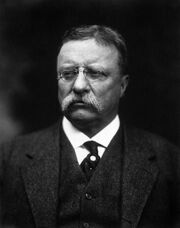Theodore "T.R." Roosevelt, Jr. (October 27, 1858 – January 6, 1919) was an American author, naturalist, explorer, historian, and politician who served as the 26th President of the United States. He was a leader of the Republican Party (the "GOP") and founder of the Progressive Party. He is noted for his exuberant personality, range of interests and achievements, and his leadership of the Progressive Movement, as well as his "cowboy" persona and robust masculinity.
When the Spanish–American War broke out in 1898 he helped form the famous Rough Riders, a combination of wealthy Easterners and Western cowboys. He gained national fame for his courage in battle in Cuba, then returned to be elected governor of New York. He was elected as the Vice President for William McKinley in 1901 and became President itself after McKinley was assassinated.
Roosevelt called his domestic policies a "Square Deal", promising a fair deal to the average citizen while breaking up monopolistic corporations, holding down railroad rates, and guaranteeing pure food and drugs. He was the first president to speak out on conservation, and he greatly expanded the system of national parks and national forests. His foreign policy focused on the Caribbean, where he built the Panama Canal and guarded its approaches. There were no wars, but his slogan, "Speak softly and carry a big stick" was underscored by sending the greatly expanded Navy, the Great White Fleet, on a world tour. He negotiated an end to the Russo-Japanese War, for which he won the Nobel Peace Prize.
At the end of his second term, Roosevelt supported his close friend William Howard Taft for the 1908 Republican nomination. After leaving office, he toured Africa and Europe, and on his return in 1910 he broke with President Taft on issues of progressivism and personalities. In the 1912 election Roosevelt tried but failed to block Taft's renomination. He then launched the Progressive ("Bull Moose") Party that called for progressive reforms, splitting the Republican vote. That allowed Democrat Woodrow Wilson to win the White House and Congress, while the Taft conservatives gained control of the GOP for decades.
Roosevelt then led a major expedition to the Amazon jungles and contracted several illnesses. From 1914 to 1917 he campaigned for American entry into World War I, and reconciled with GOP leadership. He was seen as the frontrunner for the GOP nomination in the 1920 election, but his health collapsed and he died in 1919. Woodrow Wilson's vice president, Thomas R. Marshall, said that "Death had to take Roosevelt sleeping, for if he had been awake, there would have been a fight." Roosevelt has consistently been ranked by scholars as one of the greatest U.S. Presidents.
Alternate versions of Roosevelt have been discovered in the multiverse:
- Theodore Roosevelt, 18th President of the United States (A Different World)
- Theodore Roosevelt, 20th President of the United States (A World of Difference)
- Theodore Roosevelt, 25th and 27th President of the United States (Cherry, Plum, and Chrysanthemum)
- Theodore Roosevelt, 24th and 26th President of the United States (Cinco De Mayo)
- Theodore Roosevelt, 21st President of the United States (French Trafalgar, British Waterloo)
- Theodore Roosevelt, 26th and 28th President of the United States (George Washington Born in the 19th Century)
- Theodore Roosevelt, 28th President of the United States (Losers Become the President)
- Theodore Roosevelt, 25th Vice-President of the United States and Nationalist candidate for President in 1908 (Napoleon's World)
- Theodore Roosevelt, 26th and 28th President of the United States (Progressive Success)
- Theodore Roosevelt, 29th and 31st President of the United States (The Found Order)
- Theodore Roosevelt, 28th President of the United States (Vive l'Emperor)
- Theodore Roosevelt, 25th President of the United States (What Luck!)
See also:

